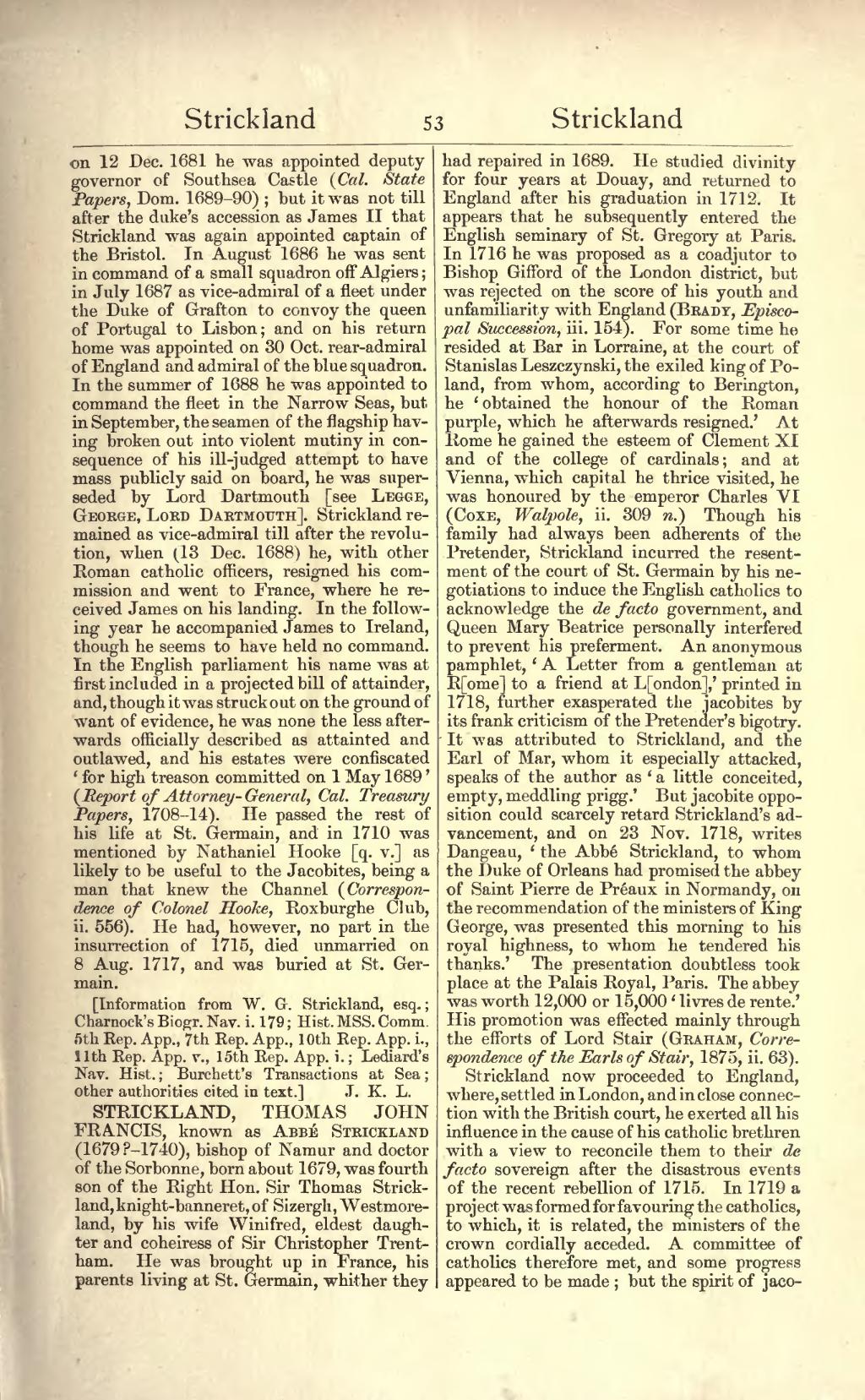on 12 Dec. 1681 he was appointed deputy governor of Southsea Castle (Cal. State Papers, Dom. 1689–90); but it was not till after the duke's accession as James II that Strickland was again appointed captain of the Bristol. In August 1686 he was sent in command of a small squadron off Algiers; in July 1687 as vice-admiral of a fleet under the Duke of Grafton to convoy the queen of Portugal to Lisbon; and on his return home was appointed on 30 Oct. rear-admiral of England and admiral of the blue squadron. In the summer of 1688 he was appointed to command the fleet in the Narrow Seas, but in September, the seamen of the flagship having broken out into violent mutiny in consequence of his ill-judged attempt to have mass publicly said on board, he was superseded by Lord Dartmouth [see Legge, George, Lord Dartmouth]. Strickland remained as vice-admiral till after the revolution, when (13 Dec. 1688) he, with other Roman catholic officers, resigned his commission and went to France, where he received James on his landing. In the following year he accompanied James to Ireland, though he seems to have held no command. In the English parliament his name was at first included in a projected bill of attainder, and, though it was struck out on the ground of want of evidence, he was none the less afterwards officially described as attainted and outlawed, and his estates were confiscated ‘for high treason committed on 1 May 1689’ (Report of Attorney-General, Cal. Treasury Papers, 1708–14). He passed the rest of his life at St. Germain, and in 1710 was mentioned by Nathaniel Hooke [q. v.] as likely to be useful to the Jacobites, being a man that knew the Channel (Correspondence of Colonel Hooke, Roxburghe Club, ii. 556). He had, however, no part in the insurrection of 1715, died unmarried on 8 Aug. 1717, and was buried at St. Germain.
[Information from W. G. Strickland, esq.; Charnock's Biogr. Nav. i. 179; Hist. MSS. Comm. 5th Rep. App., 7th Rep. App., 10th Rep. App. i., 11th Rep. App. v., 15th Rep. App. i.; Lediard's Nav. Hist.; Burchett's Transactions at Sea; other authorities cited in text.]
STRICKLAND, THOMAS JOHN FRANCIS, known as Abbé Strickland (1679?–1740), bishop of Namur and doctor of the Sorbonne, born about 1679, was fourth son of the Right Hon. Sir Thomas Strickland, knight-banneret, of Sizergh, Westmoreland, by his wife Winifred, eldest daughter and coheiress of Sir Christopher Trentham. He was brought up in France, his parents living at St. Germain, whither they had repaired in 1689. He studied divinity for four years at Douay, and returned to England after his graduation in 1712. It appears that he subsequently entered the English seminary of St. Gregory at Paris. In 1716 he was proposed as a coadjutor to Bishop Gifford of the London district, but was rejected on the score of his youth and unfamiliarity with England (Brady, Episcopal Succession, iii. 154). For some time he resided at Bar in Lorraine, at the court of Stanislas Leszczynski, the exiled king of Poland, from whom, according to Berington, he ‘obtained the honour of the Roman purple, which he afterwards resigned.’ At Rome he gained the esteem of Clement XI and of the college of cardinals; and at Vienna, which capital he thrice visited, he was honoured by the emperor Charles VI (Coxe, Walpole, ii. 309 n.) Though his family had always been adherents of the Pretender, Strickland incurred the resentment of the court of St. Germain by his negotiations to induce the English catholics to acknowledge the de facto government, and Queen Mary Beatrice personally interfered to prevent his preferment. An anonymous pamphlet, ‘A Letter from a gentleman at R[ome] to a friend at L[ondon],’ printed in 1718, further exasperated the jacobites by its frank criticism of the Pretender's bigotry. It was attributed to Strickland, and the Earl of Mar, whom it especially attacked, speaks of the author as ‘a little conceited, empty, meddling prigg.’ But jacobite opposition could scarcely retard Strickland's advancement, and on 23 Nov. 1718, writes Dangeau, ‘the Abbé Strickland, to whom the Duke of Orleans had promised the abbey of Saint Pierre de Préaux in Normandy, on the recommendation of the ministers of King George, was presented this morning to his royal highness, to whom he tendered his thanks.’ The presentation doubtless took place at the Palais Royal, Paris. The abbey was worth 12,000 or 15,000 ‘livres de rente.’ His promotion was effected mainly through the efforts of Lord Stair (Graham, Correspondence of the Earls of Stair, 1875, ii. 63).
Strickland now proceeded to England, where, settled in London, and in close connection with the British court, he exerted all his influence in the cause of his catholic brethren with a view to reconcile them to their de facto sovereign after the disastrous events of the recent rebellion of 1715. In 1719 a project was formed for favouring the catholics, to which, it is related, the ministers of the crown cordially acceded. A committee of catholics therefore met, and some progress appeared to be made; but the spirit of jaco-
